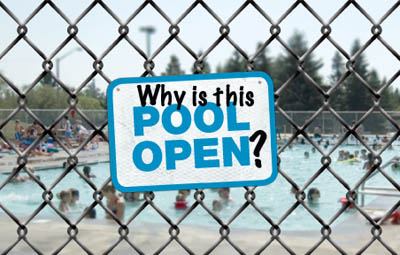Commercial pool operators throughout Texas are allowing hazardous pools to remain open, despite warnings from health inspectors and service technicians, according to various sources.
Pool professionals claim that hazards such as cloudy water and unlocked gates have resulted in a number of drownings in 2011 alone.
“Some commercial operators are very reluctant to close a pool, even when the water’s so cloudy you can’t see the bottom,” said Mike Baker, president of the Corpus Christi Chapter of the Independent Pool & Spa Service Association. “Even when I explain the drowning hazard, some still won’t close it.”
In many cases, operator resistance is a result of pressure from tenants, ignorance of current regulations, or lack of available funds, Baker said. Complicating the problem is the fact that some municipal health inspectors fail to enforce a state requirement that any commercial pool in violation of safety standards must be closed immediately until the issue is resolved.
This lack of enforcement may stem from short-handedness, since the state provides no funds to city health departments for the specific purpose of inspecting pools. This means many hazards on commercial sites are discovered not by health inspectors, but by service techs, who have no power to enforce the law.
However, even when inspectors do arrive on-site, some are unfamiliar with current state codes on water clarity and pool enclosures. So violations often slip by unnoticed.
“You can go to some cities, and the inspectors are hardly enforcing any of the safety regulations unless there’s a specific complaint,” Baker said.
Thus, many commercial pools continue to operate with hazards such as blockable main drains, cloudy water and unlocked gates — even after the city health department has noted the violation.
“We’ve seen a lot of operators simply refuse to change a noncompliant drain cover,” said Dave Galloway, president of Galloway Pools & Spas Inc. in Corpus Christi, Texas.
Galloway’s techs do their best to communicate with noncompliant site owners in person; they also note any hazards in writing on their invoices. (Legal experts recommend sending the operator a certified letter describing the hazard, and explaining any need for temporary closure, in order to document that the service company performed its legal duty to inform the operator of the problem.) Still, Baker notes that significant change will have to come from the Texas Department of State Health Services.
“It’d hardly cost anything for them to send out a letter to city and county health departments explaining the code, and explaining why operators need to abide by it,” he said. “And that would make a huge difference.”
Texas officially began tracking drowning rates in 2005; and in 2008, child drowning deaths hit a record high of 82. That rate has declined somewhat in more recent years, but experts stress that vigilance remains crucial.


